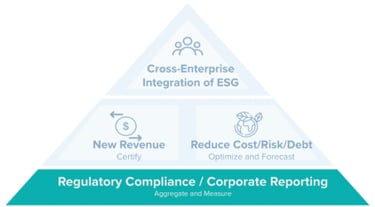.png)
The crucial step most companies are missing.
With investors and governments putting increasing value on ESG, all companies are looking for an ESG approach that will prepare and protect them for the future. However, there are a dizzying number of options available, obscuring the path forward towards building an sustainable ESG program. To best overcome this problem, a data-driven holistic approach that integrates ESG into your core business decisions is critical.
To learn more about building an integrated ESG program, read below and watch our virtual roundtable where Validere’s VP of Strategy, Mark Le Dain, hosts a panel discussion with three ESG experts:
Tamar Epstein, General Counsel, Validere; former Associated Counsel for IPC
Andrew Pisano, Head of XRegistries, Xpansiv
Courtney Lowrance, Managing Director of Sustainable Banking and Corporate Transitions, Citi

Regulatory reporting is the foundation of any ESG program. These reporting programs already collect some of the needed data to create a nimble ESG program.
The opportunity missing for most companies is automating the necessary measurement and data management by aggregating all ESG-related data into one place. This central source of truth enables a scalable and auditable data foundation that can be trusted both internally and externally.
The trust that we’re starting to garner from our market participants is achieved through the rigor and the integrity of our data sources, and the processes that we have around them. – Andrew Pisano, Xpansiv
With this trusted foundation, companies can leverage their regulatory data as the base for their voluntary, corporate reporting of ESG progress. By unifying both the regulatory and corporate reporting frameworks with a single source of truth, it makes all ESG reporting more efficient — and more credible.
Once regulatory and corporate reporting is tackled, you can unlock other opportunities and insights that only a unified data foundation can provide.
Companies should start thinking about data beyond compliance, so that they’re getting full value of the data – Tamar Epstein, Validere
With a trusted ESG reporting foundation, you can now towards certifying commodities that have positive ESG attributes such as lower methane emissions footprint or responsibly developed production. Doing so can allow you to capture additional value in the market as oil and gas buyers are increasingly placing financial value on ESG conscious commodities. Certification can only happen when the ESG data behind that commodity can be fully trusted, meaning that it is auditable from beginning to end.
To see what this can look like, take a look at the Énergir-Pacific Canbriam responsibly-sourced gas agreement.
Certification is not the only thing you can do once you have a trusted data foundation. Just as importantly, you should incorporate ESG considerations into your broad business decisions.
Data is power. With more data that’s linked to financial materiality, you’re going to have more flexibility forecasting future liabilities in a way you don’t have without the granular data. – Courtney Lowrance, Citi
With ESG becoming top of mind with investors and regulators, it is critical to understand future ESG-related costs or liabilities when making business decisions, including portfolio decisions. Making these decisions will require trusted data on the ESG attributes of commodities and assets.
ESG is already incorporated into cost of capital calculations for many institutions, meaning affordable access to capital will increasingly rely on trusted ESG data.
So what’s the first move for an energy company in an increasingly confusing ESG solution space? A trusted data foundation that integrates into your core business practices. A holistic solution satisfies current reporting needs but also amplifies the value of your data by enabling you to sell your molecules at a premium and to make more informed business decisions.
Watch the webinar here.

Trevor Cross
Trevor is a Product Marketing Manager at Validere and has a M.Sc in Chemistry from the University of British Columbia. He has previous experience in chemical research with a particular interest in leading technologies for the energy transition.
